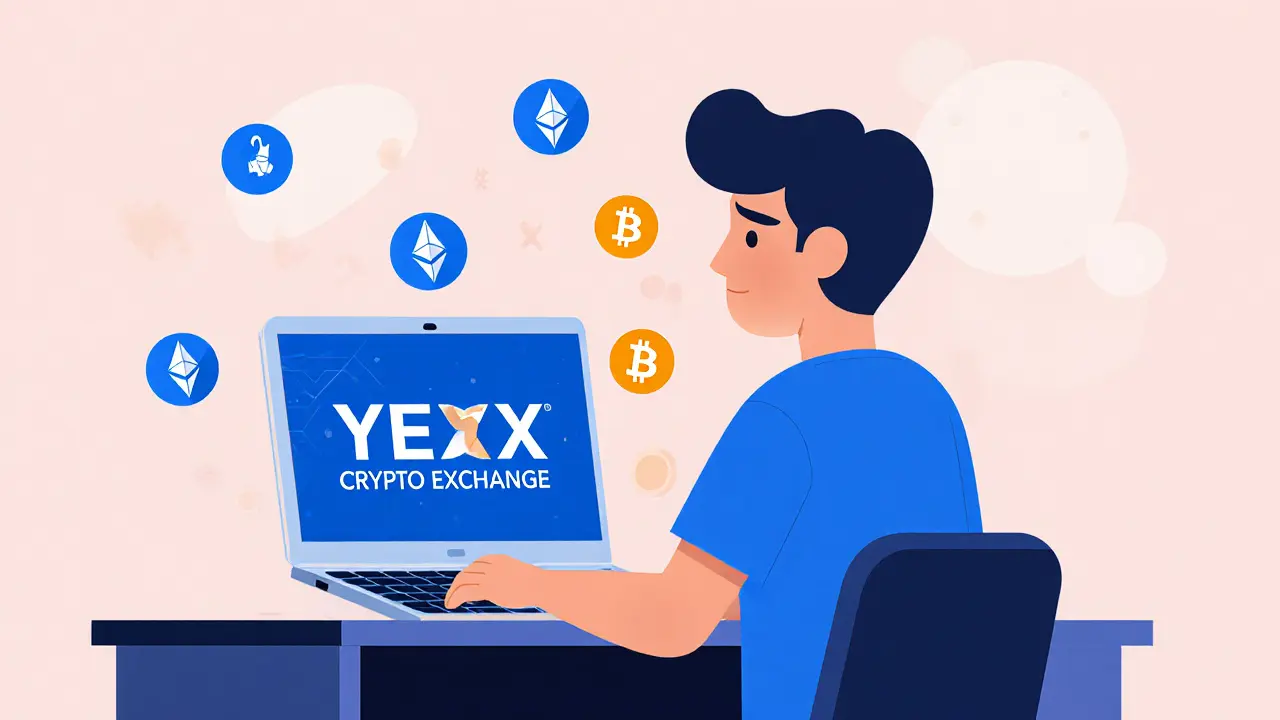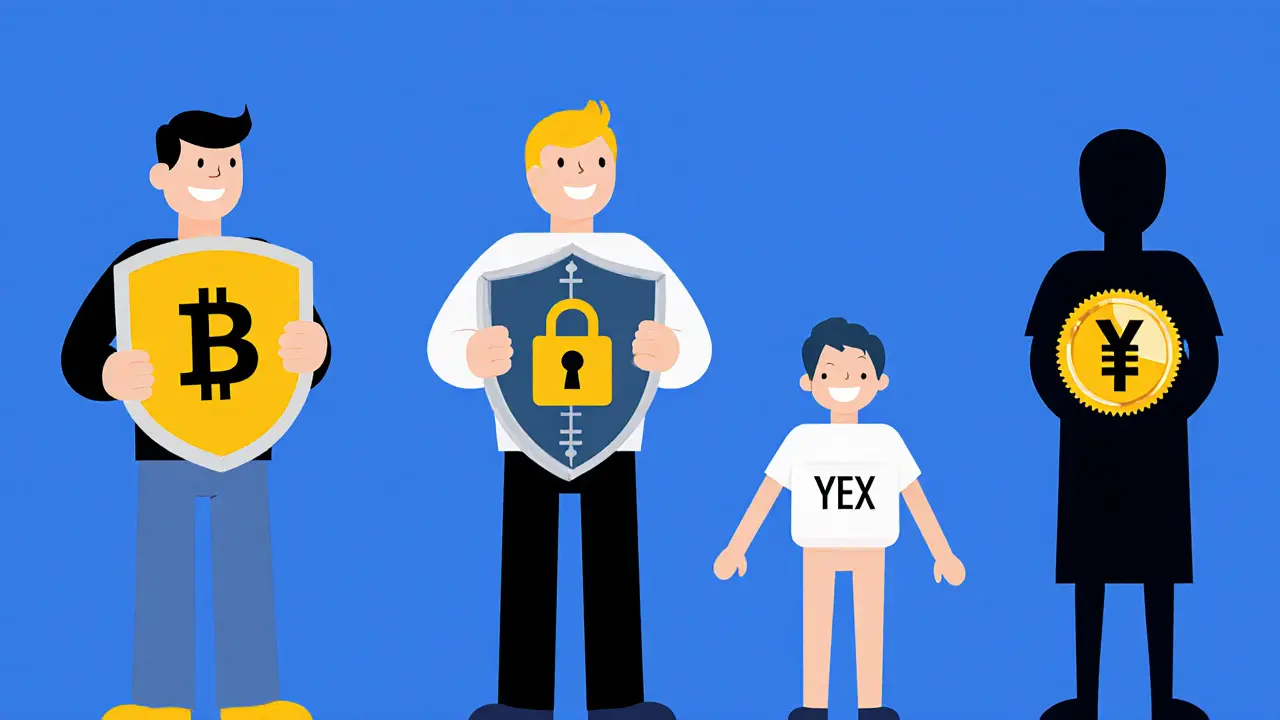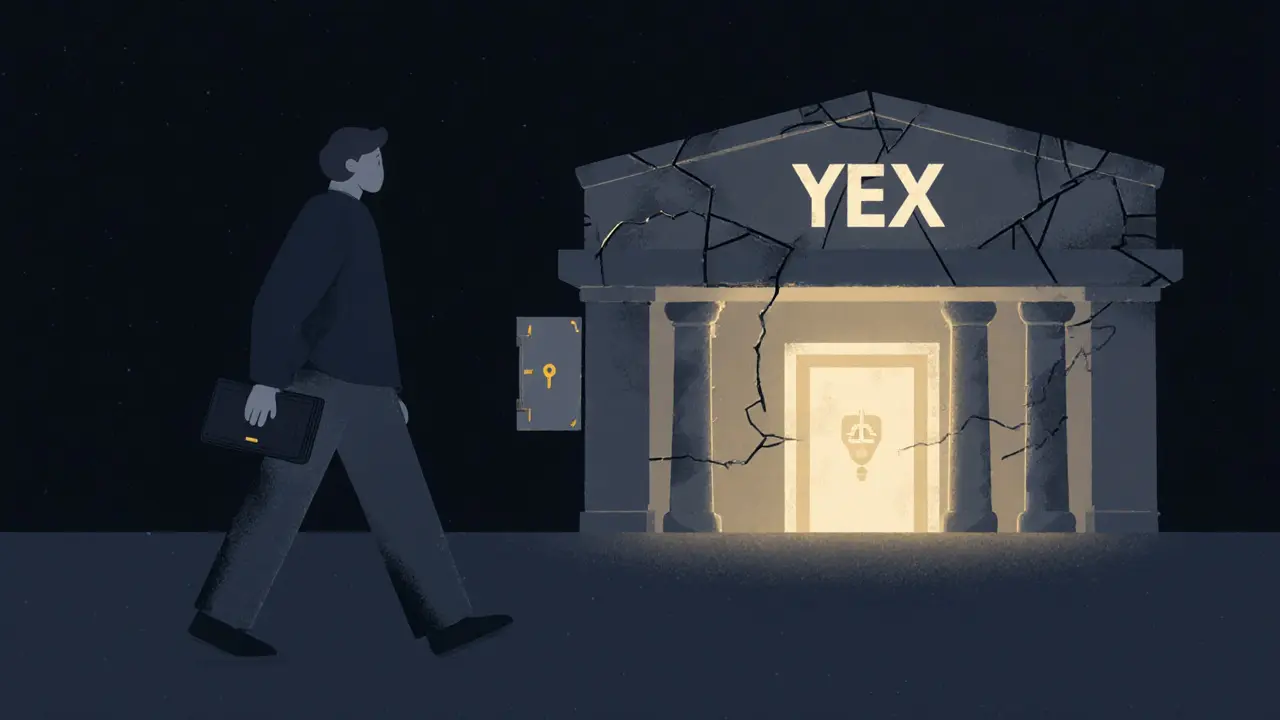YEX Crypto Exchange Review 2025 - Is It Safe or a Scam?
 Jul, 26 2025
Jul, 26 2025
Crypto Exchange Security Checker
Security Assessment Tool
Evaluate any cryptocurrency exchange against industry-standard security practices to determine if it meets minimum safety requirements.
Enter Exchange Information
Security Assessment Results
When you hear a new name like YEX Crypto Exchange (often shortened to YEX) claims to let users trade Bitcoin, Ethereum and dozens of altcoins with just a few clicks, the first question is: does it actually protect your money?
What makes a crypto exchange trustworthy?
Legitimate platforms usually shout about a handful of security pillars. If you can see them listed on the homepage or in a public audit, that’s a good sign.
- Multi-Factor Authentication (MFA) adds a second layer, like a phone code, on top of your password. It blocks attackers who somehow get hold of your login details.
- Cold Storage keeps the bulk of user funds offline, away from hackers. Top exchanges store 95‑98% of assets this way.
- SOC‑2 Audit is a third‑party review that checks how a service protects data and manages security risk. Passing it shows the platform follows industry‑wide controls.
- Insurance coverage for custodial losses, real‑time monitoring of suspicious activity, and compliance with the FATF’s Travel Rule are also strong signals.
If any of these are missing or hidden, you should dig deeper.
How the big players handle security
Let’s see what the market leaders actually do. This gives you a benchmark to measure YEX against.
Binance offers MFA, hardware‑wallet‑level cold storage for 95% of assets, and regular SOC‑2 Type II reports. It also runs a $200 million insurance fund for certain losses.
Coinbase stores 98% of customer crypto in offline vaults and provides mandatory 2FA for every account. Its latest SOC‑2 audit was published in Q1 2025.
Kraken combines multi‑signature wallets, cold storage, and a $100 million insurance policy for custodial assets. Kraken also publishes a transparency report on its security incidents.
All three list these safeguards prominently on their sites, making it easy for a user to verify the claims.
Red flags that appear around YEX
When we search reputable sources-industry blogs, security firms, and user‑review platforms-we find virtually no mention of YEX. That silence itself is a warning sign.
Key concerns include:
- No public MFA implementation details. A genuine exchange typically explains whether it offers SMS codes, authenticator apps, or hardware keys.
- No cold‑storage percentages disclosed. Without this data, you can’t know how much of your deposit sits online and exposed.
- No SOC‑2, ISO‑27001, or any third‑party audit reports. Audits are costly and usually highlighted as a trust factor.
- Lack of an insurance policy. Companies like Binance and Kraken advertise coverage to reassure users.
- Absence of user feedback on forums like Reddit, Trustpilot, or specialized crypto review sites. Real users tend to leave a paper trail-positive or negative.
- Security‑research firms such as DataVisor warn that many fake exchanges skip basic protections and disappear with user funds. Their reports list YEX among platforms with no verifiable security posture.
All these points line up with the pattern that DataVisor describes for “fake cryptocurrency exchanges.”
How to vet an exchange before you deposit
Follow this checklist every time you consider a new platform:
- Check the homepage for a clear security section. Look for MFA, cold storage, insurance, and audit badges.
- Search the web for the exchange name + “SOC‑2”, “audit”, “insurance”. If nothing appears, treat it as a red flag.
- Read community forums (Reddit, Bitcointalk, Trustpilot). Genuine platforms have both praise and complaints.
- Verify the domain’s SSL certificate and check for DNSSEC or registry‑lock status using tools like SecurityTrails.
- Test the withdrawal process with a tiny amount (e.g., $10). Delays or “account verification” requests can hint at scams.
- Confirm the exchange complies with the FATF Travel Rule. Look for a KYC/AML page that references the rule explicitly.
- Keep backups of private keys and never store large sums on an exchange-use a hardware wallet instead.
Applying this checklist to YEX raises more questions than answers, meaning you should proceed with extreme caution.

Side‑by‑side security comparison
| Feature | YEX | Binance | Coinbase | Kraken |
|---|---|---|---|---|
| Multi‑Factor Authentication | Not documented | SMS, Authenticator, YubiKey | Authenticator app, hardware keys | Authenticator app, hardware keys |
| Cold Storage % | Unknown | ≈95% | ≈98% | ≈96% |
| SOC‑2 / ISO Audits | None listed | SOC‑2 Type II (2024) | SOC‑2 Type II (2025) | SOC‑2 Type II (2023) |
| Insurance Coverage | None disclosed | $200 M (custody) | $125 M (custody) | $100 M (custody) |
| User Reviews (Public) | None found | Hundreds on Reddit, Trustpilot | Thousands on forums, rating 4.5/5 | Active community, rating 4.3/5 |
The table makes it clear that YEX lags behind every major metric that seasoned traders use to gauge safety.
The bottom line: should you trade on YEX?
Based on the lack of publicly available security details, missing audit reports, and zero presence on reputable review sites, the safest answer is “no.” Until YEX publishes concrete evidence-MFA screens, cold‑wallet percentages, a SOC‑2 audit, and an insurance policy-you should keep your crypto on a proven exchange or, better yet, in a hardware wallet you control.
Remember, the crypto world is full of innovative platforms, but the ones worth your money are the ones that brag about safety as loudly as they brag about low fees. If an exchange’s security story is a whisper, treat it as a warning.
Is YEX regulated in any jurisdiction?
Public records do not show YEX holding a license from the FCA, SEC, or any major financial regulator. Legitimate exchanges usually display a regulator badge, and without it you should assume the platform operates without oversight.

Can I trust the fees listed on YEX?
Since YEX does not publish a transparent fee schedule, users report hidden charges during withdrawals. A trustworthy exchange always lists maker/taker fees and withdrawal costs up front.
What steps should I take if I’ve already deposited on YEX?
Withdraw the funds immediately, even if it means a small fee. Keep screenshots of the transaction, and monitor your wallet for any odd activity. If the exchange becomes unresponsive, consider filing a complaint with your local consumer protection agency.
How do I verify an exchange’s SOC‑2 audit?
Look for a PDF or a link to the audit on the exchange’s security page. The document should be signed by an independent audit firm and dated within the past 12 months.
Are there any legitimate alternatives to YEX for low‑fee trading?
Yes. Binance, Kraken, and KuCoin all offer sub‑0.1% maker fees for high‑volume traders while still providing the security features outlined above.
Will Barnwell
October 24, 2025 AT 15:26YEX? Never heard of it. If it's not on CoinGecko or CoinMarketCap, it's not real. Just don't touch it. Period.
Henry Gómez Lascarro
October 25, 2025 AT 12:10Look, I get it - you're scared of losing money, and that's fine. But let's be real: the entire crypto space is built on trust assumptions. You think Binance is safe? They got hacked in 2019 and paid it off with their own funds. Kraken? They still had a phishing incident last year. Coinbase? Their app crashes every time the market moves. So you're telling me the absence of a SOC-2 audit is the end-all-be-all? That's like refusing to fly because one airline didn't publish its runway inspection logs. The real red flag here is your obsession with bureaucratic checkboxes instead of actual user behavior. If YEX had a thriving community, active devs, and a functional API, would you still care if they didn't have a fancy audit? Or are you just looking for validation to feel superior by naming every risk in the book while ignoring the fact that 90% of the 'trusted' exchanges are just VC-funded marketing machines with the same vulnerabilities? I'm not saying YEX is legit - I'm saying your checklist is the problem. It's not about security theater - it's about whether people are actually using it and whether their funds are moving. And if nobody's talking about it? Maybe it's because nobody's dumb enough to deposit yet. That's not a red flag - that's a feature.
Matt Zara
October 25, 2025 AT 17:13Bro I just tried signing up on YEX for fun 😅 and the UI was actually kinda slick? Like, no popups, no weird redirects, and the deposit screen loaded fast. I didn't deposit anything, just checked the flow. Maybe it's new and just hasn't had time to build up reviews yet? I'm not saying it's safe, but maybe give it a little time? I've seen legit projects start with zero buzz and grow. Just go slow, test with $5, and see how the withdrawals go. 🚀🙏
Jean Manel
October 26, 2025 AT 13:30Henry, you're the reason people lose money. You romanticize obscurity. If a platform doesn't disclose basic security metrics, it's not 'under the radar' - it's a ghost ship. And Lawrence, testing with $5? That's not due diligence, that's gambling with your optimism. The fact that you're even considering this shows how broken crypto education is. This isn't a startup - it's a honeypot. The fact that you're not asking why no security firm has ever flagged it? That's the real red flag. Stop pretending ignorance is neutrality. You're not being open-minded - you're being prey.
Lawrence rajini
October 27, 2025 AT 07:23Y’all are overcomplicating this 😤 Just don’t put money in places you don’t understand. I checked YEX - zero Reddit threads, zero Trustpilot reviews, zero YouTube tutorials. That’s not a hidden gem, that’s a ghost town. I’d rather hold BTC in my cold wallet than risk it on a site with no name. Stay safe, stay humble, and don’t chase shiny new things. 🛡️₿